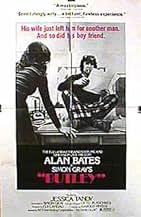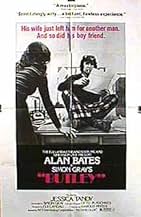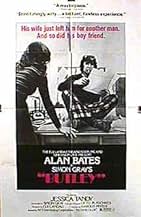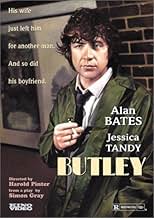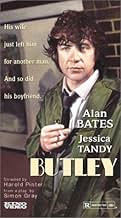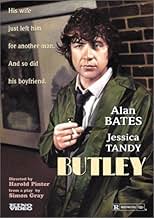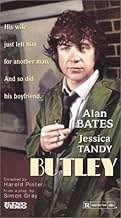Adicionar um enredo no seu idiomaAn English professor finds his life crumbling around him.An English professor finds his life crumbling around him.An English professor finds his life crumbling around him.
Jill Goldston
- Tube Passenger
- (não creditado)
Lindsay Ingram
- Female Student
- (não creditado)
Anthony Lang
- Tube Passenger
- (não creditado)
Patti Love
- Female Student
- (não creditado)
Belinda Low
- Female Student
- (não creditado)
Derrick O'Connor
- Irishman in pub
- (não creditado)
John Savident
- James
- (não creditado)
Susan Wooldridge
- Female Student
- (não creditado)
Avaliações em destaque
This really plays much like a filming of a play. The direction is almost minimal. That's probably for the good given that what remains is a great bit of showmanship.
Alan Bates is stunningly good as the lead Butley. He's a brilliant professor and writer at the end of his career. There is some amazing scheming between his character and younger more promising acolytes that he is jealous of.
The only reason to watch this is for the dialogue which is sharp and literate -- one wonders what became of this. The version I saw was a film version of the play. Not much of production value but the playwright's craft is still preserved. Even mentioning all of this, it's amazing how well this holds up almost 40 years later. That's probably due to Bates' bravura performance.
Alan Bates is stunningly good as the lead Butley. He's a brilliant professor and writer at the end of his career. There is some amazing scheming between his character and younger more promising acolytes that he is jealous of.
The only reason to watch this is for the dialogue which is sharp and literate -- one wonders what became of this. The version I saw was a film version of the play. Not much of production value but the playwright's craft is still preserved. Even mentioning all of this, it's amazing how well this holds up almost 40 years later. That's probably due to Bates' bravura performance.
A movie like this works as a small-setting exercise in actor virtuosity -- Bates grabs the individual words, twirls them around, and pitches them at his enemies with a high-pitched, womanly cackle -- and it works brilliantly on that level. But it also works on a larger level of a man who uses words as an evasive tool. Of course no one really talks like this, no one is this witty, but more than just entertaining dialogue (and some of it is very funny) the writing does serve an emotional purpose. Bates' performance, as a professor who avoids his contemporaries and who tries to dig into the mind of his young male lover, is incredibly good; it's like he's tap-dancing on top of himself with the exuberant joy of performance. And I loved the smart, youthful, innocent-patient tenderness in O' Callaghan's performance as the lover he shares an office with (where the majority of the film takes place).
Butley the man can't quite be explained, even though certain facets of his personality are obvious -- he's coated in irony, yet that can't hide his failings: he's jealous of the woman who's getting published while he's not, he can't stand students who just want to learn, and he's resentful of the man stealing his boyfriend from him. But yet he desperately goes chasing after people down the hall, just to get the last word in; he almost literally hangs off the doorknob while various characters come into his office; he screeches at the top of his lungs just to see if his leaving visitor will stop and come back. Butley does so often talk in the false hypothetical -- that type of grandstanding where he mentions something abstractly that specifically refers to someone -- that at times it's difficult to pinpoint who, exactly, he's referring to. (When he talks to Reg, the man stealing his boyfriend from him, does he use words like "queer" and "fairy" intending to mock himself to shock Reg, or to mock Reg in the guise of innocently questioning him?) While I didn't quite catch all the literary references -- just about the only drawback for me -- this is one of the most satisfying movies I've seen about the handling of a dying relationship. 10/10
Butley the man can't quite be explained, even though certain facets of his personality are obvious -- he's coated in irony, yet that can't hide his failings: he's jealous of the woman who's getting published while he's not, he can't stand students who just want to learn, and he's resentful of the man stealing his boyfriend from him. But yet he desperately goes chasing after people down the hall, just to get the last word in; he almost literally hangs off the doorknob while various characters come into his office; he screeches at the top of his lungs just to see if his leaving visitor will stop and come back. Butley does so often talk in the false hypothetical -- that type of grandstanding where he mentions something abstractly that specifically refers to someone -- that at times it's difficult to pinpoint who, exactly, he's referring to. (When he talks to Reg, the man stealing his boyfriend from him, does he use words like "queer" and "fairy" intending to mock himself to shock Reg, or to mock Reg in the guise of innocently questioning him?) While I didn't quite catch all the literary references -- just about the only drawback for me -- this is one of the most satisfying movies I've seen about the handling of a dying relationship. 10/10
Simon Gray's extremely talky, darkly comic 1971 play is cinematized here, direct from the text, for television's American Film Theatre.
Doughy-faced and feckless-looking Alan Bates gives a bravura, nonstop performance as the eponymous sloppy, over-literate, misanthropic, washed-up English professor at the University of London. He is an unlikeable character, so there's no sympathizing with him; it's more like watching a train wreck.
But Bates inhabits the role fiercely, and makes him entertaining and lively -- and at times funny -- enough to hold our attention for the two-hour performance, 95% of which takes place in a single room. The room is Butley's office, which he shares with his longterm young lover Joey, now an assistant lecturer.
"Butley" feels a bit like Albee's "Who's Afraid of Virginia Woolf?", which was written nine years prior to Gray's play. Butley's verbal diatribes go for the jugular, but in allusive, literary or nursery-rhymey, uber-rhetorical, abstract, indirect, and bitterly sarcastic ways. It's a lot to pay attention to -- especially the literary quotes and allusions. And sometimes it's a bit much watching a man go through a slow meltdown in the guise of skewering anyone and everyone around him: Joey, his ex-wife, his students and colleagues, Joey's new love interest, and anyone who even tries to get close to or talk reason to him.
What seems like it might become unrelieved verbal cruelty is thankfully mitigated from time to time by the thoughtful, intelligent, gentle integrity of Joey (wonderfully played by Richard O'Callaghan, who, like Bates, originated his role), and by some real laugh-out-loud moments, and by a character or two who seem for a time to beat Butley at his own cruel mind games.
In the end, the play seems to come full circle metaphorically, giving the audience at least a sense of symmetry and unity and finally quietude before it closes. A worthwhile watch if you like cinematized plays or want more of the very impressive Alan Bates.
Doughy-faced and feckless-looking Alan Bates gives a bravura, nonstop performance as the eponymous sloppy, over-literate, misanthropic, washed-up English professor at the University of London. He is an unlikeable character, so there's no sympathizing with him; it's more like watching a train wreck.
But Bates inhabits the role fiercely, and makes him entertaining and lively -- and at times funny -- enough to hold our attention for the two-hour performance, 95% of which takes place in a single room. The room is Butley's office, which he shares with his longterm young lover Joey, now an assistant lecturer.
"Butley" feels a bit like Albee's "Who's Afraid of Virginia Woolf?", which was written nine years prior to Gray's play. Butley's verbal diatribes go for the jugular, but in allusive, literary or nursery-rhymey, uber-rhetorical, abstract, indirect, and bitterly sarcastic ways. It's a lot to pay attention to -- especially the literary quotes and allusions. And sometimes it's a bit much watching a man go through a slow meltdown in the guise of skewering anyone and everyone around him: Joey, his ex-wife, his students and colleagues, Joey's new love interest, and anyone who even tries to get close to or talk reason to him.
What seems like it might become unrelieved verbal cruelty is thankfully mitigated from time to time by the thoughtful, intelligent, gentle integrity of Joey (wonderfully played by Richard O'Callaghan, who, like Bates, originated his role), and by some real laugh-out-loud moments, and by a character or two who seem for a time to beat Butley at his own cruel mind games.
In the end, the play seems to come full circle metaphorically, giving the audience at least a sense of symmetry and unity and finally quietude before it closes. A worthwhile watch if you like cinematized plays or want more of the very impressive Alan Bates.
One of the primary reasons for seeing this adaptation of 'Butley' is that it is one of the thirteen films making up the American Film Theatre series, which was an interesting and ambitious project but a flawed one. It is hard to go wrong with having a fine actor like Alan Bates, who sounded perfect and did two other films in the series (the others being 'Three Sisters' and 'In Celebration'). The play is good fun and Harold Pinter as director intrigued me, knowing him better for his play and screen writing.
'Butley' more than does the source material justice, managing to be faithful in detail and spirit to it without being too much so. It is easily one of the top 3 best films in the American Film Theatre series along with 'The Iceman Cometh' and 'The Homecoming' (the latter of which being written by Pinter and one of his finest plays) and by quite some way the best since 'The Homecoming'. It is highly recommended and has more to it than just curiosity value.
Pinter's direction is a little too laconic on occasion, which meant that the energy wasn't always consistent (this was fleetingly though).
A vast majority of it though is absolutely fine, very intelligent, precise and not losing the play's necessary exuberance. The script is talk-heavy, as is expected from a play, but it doesn't feel wordy. Instead it felt sharp, smart and amusing in a dark but never distasteful way.
It's a well shot and produced film, with not near as much of a too filmed play feel that most films in the American Film Theatre series suffer from. The energy is near constant. Once again the characters are deeply flawed but not one's definition of likeable (not a problem for me but this has been a criticism that has popped up in reviews for most of the series' films), but they are meaty and feel real.
While Jessica Tandy and Simon O'Callaghan are both excellent, the best thing about 'Butley' is the intense and exuberant tour de force performance from Bates.
Concluding, great and one of the series' best. 9/10.
'Butley' more than does the source material justice, managing to be faithful in detail and spirit to it without being too much so. It is easily one of the top 3 best films in the American Film Theatre series along with 'The Iceman Cometh' and 'The Homecoming' (the latter of which being written by Pinter and one of his finest plays) and by quite some way the best since 'The Homecoming'. It is highly recommended and has more to it than just curiosity value.
Pinter's direction is a little too laconic on occasion, which meant that the energy wasn't always consistent (this was fleetingly though).
A vast majority of it though is absolutely fine, very intelligent, precise and not losing the play's necessary exuberance. The script is talk-heavy, as is expected from a play, but it doesn't feel wordy. Instead it felt sharp, smart and amusing in a dark but never distasteful way.
It's a well shot and produced film, with not near as much of a too filmed play feel that most films in the American Film Theatre series suffer from. The energy is near constant. Once again the characters are deeply flawed but not one's definition of likeable (not a problem for me but this has been a criticism that has popped up in reviews for most of the series' films), but they are meaty and feel real.
While Jessica Tandy and Simon O'Callaghan are both excellent, the best thing about 'Butley' is the intense and exuberant tour de force performance from Bates.
Concluding, great and one of the series' best. 9/10.
10B24
The late Alan Bates had many "bests" (if one may be permitted to say so)because of the constant intensity he brought to every role. He made acting something of a physical sport. In this case, his neurotic Butley uses language as a fencer's epee, yielding nothing to putative antagonists in the tight confines of an English department office in a major university as the camera follows him doggedly thrusting and parrying without pause. I especially liked the puns and double entendres (obviously). This sort of thing is not for everyone, of course, and I do not blame the viewer who is easily bored by such verbal jousting.
Did I mention the superb camera work? It is a tour de force to take a stage play like this one and make it come alive on film. Great acting and great direction would be lost without due attention to the medium, and this one has it par excellence. As depressing as the theme may be, and as unlikeable the fictional characters, this production succeeds in demonstrating just how powerful a film can be in spite of itself. It reminded me instantly of "Who's Afraid of Virginia Woolf" in that regard. And it is uncanny in its recognition of all the unhappy details found in any college English department office.
The nicest touch, of course, was in making Butley a T. S. Eliot specialist, with a photo of the lugubrious poet pinned to the wall. Much comic relief if one knows how to spot it.
Did I mention the superb camera work? It is a tour de force to take a stage play like this one and make it come alive on film. Great acting and great direction would be lost without due attention to the medium, and this one has it par excellence. As depressing as the theme may be, and as unlikeable the fictional characters, this production succeeds in demonstrating just how powerful a film can be in spite of itself. It reminded me instantly of "Who's Afraid of Virginia Woolf" in that regard. And it is uncanny in its recognition of all the unhappy details found in any college English department office.
The nicest touch, of course, was in making Butley a T. S. Eliot specialist, with a photo of the lugubrious poet pinned to the wall. Much comic relief if one knows how to spot it.
Você sabia?
- CuriosidadesFilm direction debut and sole film direction credit for Harold Pinter.
- Citações
Ben Butley: I'm a one-woman man, and I've had mine, thank God.
Principais escolhas
Faça login para avaliar e ver a lista de recomendações personalizadas
- How long is Butley?Fornecido pela Alexa
Detalhes
- Tempo de duração
- 2 h 9 min(129 min)
- Mixagem de som
- Proporção
- 1.85 : 1
Contribua para esta página
Sugerir uma alteração ou adicionar conteúdo ausente


